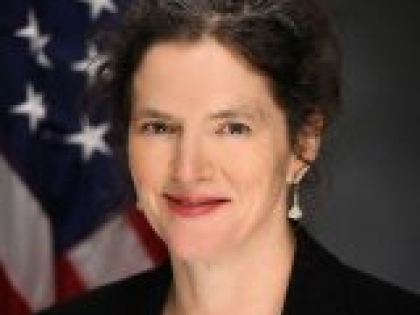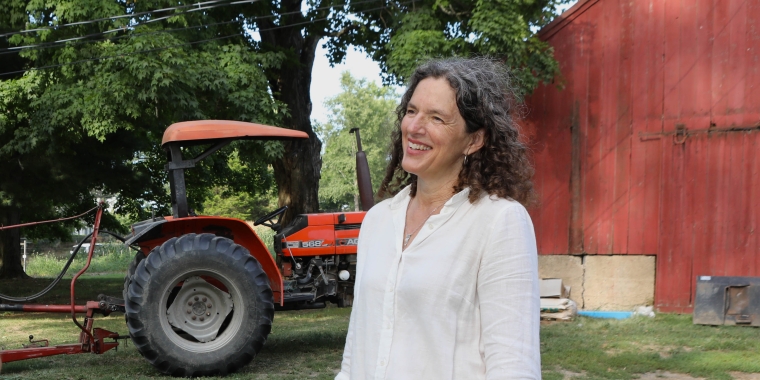
Senator Metzger Shares Perspectives of Local EMS First Responders in COVID-19 Online Series
June 19, 2020

Hudson Valley and Catskills, NY...State Senator Jen Metzger (SD-42) yesterday hosted a Facebook livestream discussion on the region’s local emergency medical services (EMS) system in her COVID-19 Community Conversations series, featuring EMS providers who serve the Mid-Hudson Valley and Catskills communities she represents. In the series’ twelfth episode, Chief Doug Foster, and Board Chairman and Treasurer, Doug Foster Jr. of Wallkill Volunteer Ambulance Corps, Matt Goodnow, Chief of New Paltz Rescue Squad, and Scott Woebse, President & CEO of Mobile Life Support Services, Inc., all shared their thoughts on the challenges and opportunities for EMS in our region, and how their work has changed during the COVID-19 pandemic.
“Our Hudson Valley and Catskills first responders are local heroes who work tirelessly to serve our communities, and it's important that people understand the unique role they play in our healthcare system as well as the challenges they have had to meet during this pandemic," said Senator Metzger. “EMS providers are so much more than just an ambulance transport service—their staff and volunteers are trained technicians administering needed emergency care that often prevents trips to the emergency room altogether."
Goodnow, Woebse, and the Fosters all observed that during the pandemic, call volume for non-COVID-related emergencies actually declined. They believe this was partly due to pervasive public fears about contracting COVID-19 at hospitals—fears, they emphasize, are unwarranted because of the strict safety protocols undertaken at hospitals. A decline in vehicular accidents due to fewer people on the road during the pandemic was another reason cited for the decline. To address the public’s concerns, the EMS providers strongly encouraged those in need of urgent, non-COVID medical attention not to hesitate in calling 911 for help.
Another major issue that needs to be addressed in our local EMS system is the general drop in providers’ volunteer base over the years, a reality that has necessitated a collaboration between volunteer services and paid services, such as Mobile Life, to fill in gaps. Wallkill Volunteer Ambulance Corps, Inc. has been partnered with Mobile Life for daytime coverage during the week for almost two years, but during the pandemic’s early stages when Mobile Life was seeing 60 to 80 potentially COVID-positive patients per day, New Paltz's paramedic staff stepped in to respond to Wallkill’s additional calls in their place. Senator Metzger’s guests noted, however, that volunteer numbers grew during the pandemic due to volunteers’ full- or part-time work opportunities being suspended during New York’s “on PAUSE” regulations.
As New York begins reopening, Senator Metzger’s guests all underscored how extra precautions were, and still are, being taken through rigorous decontamination processes and other COVID-19 protocols. The EMS personnel also went into detail about the PPE shortages they experienced early on in the pandemic, as well the intense stress that the public health crisis has caused on EMS workers. The time for each call increased greatly to maintain lengthy safety measures, and Goodnow, Woebse, and the Fosters all know EMS colleagues who opted to sleep in campgrounds away from their loved ones to protect them from potential transmission during New York state’s infection apex.
Wallkill Volunteer Ambulance Corps, Inc. said, “It was a pleasure being a part of Senator Metzger’s June 18th episode of Community Conversations. We hope the content helps educate the community on the scope and need of prehospital emergency care as well as the impact COVID-19 has made on the EMS system.”
Matt Goodnow, Chief of New Paltz Rescue Squad said, “The COVID-19 pandemic has placed a strain on the entire healthcare system with the emergency medical system being the front line of the frontlines. We have seen a huge financial burden on our agencies as we have needed more equipment and resources for protection for our crews and patients. All have sacrificed and done so proudly as this is what EMS is all about, putting others before ourselves in a system that already is very low on volunteers and funding. EMS needs to be acknowledged as the essential service it is. Thank you to Senator Metzger for acknowledging that, and for speaking with my colleagues and I. Now she needs the support of her colleagues to make this change.”
Scott Woebse, President & CEO of Mobile Life Support Services, Inc. said, “EMS has always been essential to the health and wellbeing of our communities. The Coronavirus pandemic placed our Paramedics and EMTs on the very front of the front lines to treat and help contain this disease. The impact on EMS agencies across the Hudson Valley has been dramatic and we appreciate Senator Metzger’s continuing support in helping us all navigate these difficult times.”
The EMS providers also mentioned that the COVID-19 pandemic has made remote avenues of care, like telehealth, more appealing. Earlier this week, the Governor signed into law Senator Metzger’s bill (S8416) to include audio-only services in the definition of telemedicine, allowing New Yorkers without broadband service, a computer, or smartphone to receive affordable healthcare services remotely. Thanks to the new law, phone calls with medical professionals can also be covered to ensure the widest possible access to healthcare services. Senator Metzger’s guests can all see their services including more remote care in the future.
The Senator’s Community Conversations series streams live on Thursdays at 5:00 PM on her Facebook page, engaging local experts in discussions on COVID-19 topics important to Hudson Valley and Catskill communities. Next Thursday's episode will welcome Larry Neumann, Program Supervisor of the Orange County Vet2Vet program, and Staff Sergeant Doug Sandberg, host of Let's Talk Vets on WJFF Radio Catskill, to discuss the impact of the COVID-19 pandemic on veterans services and the different resources available for veterans at federal, state, and local levels—both pandemic-related and year-round.
###



